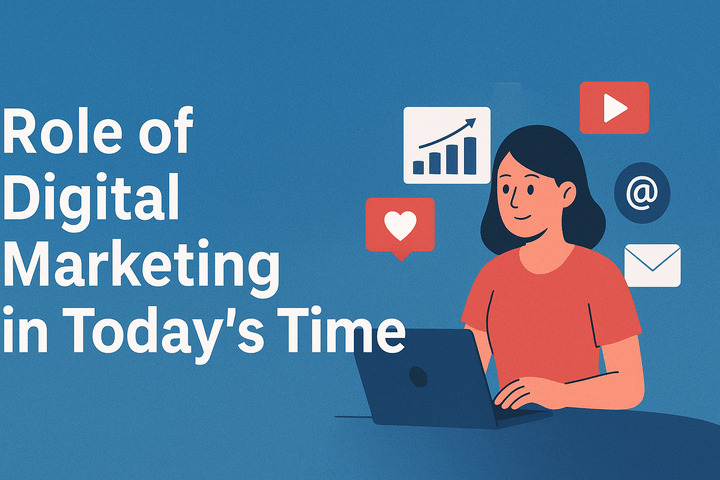Role of Digital Marketing in Today’s Time
In today’s digital-first era, the success of any business depends heavily on its ability to build visibility online, connect with the right audience, and deliver value consistently. Traditional marketing methods like billboards, print ads, and TV commercials still have relevance, but they no longer dominate consumer attention. With smartphones, social media, and advanced search engines, customers now spend most of their time online.
This is where digital marketing becomes the key driver of business growth. It provides tools and strategies that not only help businesses reach potential customers but also allow them to engage, build trust, and convert them into loyal clients.
Why Digital Marketing Matters Today
The importance of digital marketing cannot be overstated. In a world where over 5 billion people use the internet and mobile usage is at an all-time high, businesses must meet customers where they spend most of their time. Here are the reasons why digital marketing has become non-negotiable for brands:
- Global Reach: Digital platforms give businesses access to worldwide markets, making it easier for even small startups to compete with established enterprises.
- Cost-Effective: Running a digital ad campaign is far less expensive than TV or newspaper ads, and businesses can start even with small budgets.
- Measurable Results: Tools like Google Analytics, Facebook Insights, and email trackers provide real-time data about campaign performance, helping brands make data-driven decisions.
- Targeted Marketing: Unlike traditional ads, digital marketing lets you segment your audience by age, gender, location, interests, and even online behavior.
- Customer Engagement: Through social media and email, businesses can create two-way communication that builds stronger relationships and long-term loyalty.
Key Components of Digital Marketing
Digital marketing is not a single channel; it is an ecosystem of strategies that work together to drive visibility, engagement, and conversions. Below are the most important components:
1. Search Engine Optimization (SEO)
SEO is the foundation of digital marketing. By optimizing website structure, content, and technical elements, businesses can rank higher in search engine results. This increases organic traffic without relying heavily on paid ads. For example, when someone searches for “best clothing brand in India,” SEO ensures that your business appears in the top results.
- On-page SEO: Keyword optimization, content quality, and proper HTML tagging.
- Off-page SEO: Backlinks, guest posts, and online authority building.
- Technical SEO: Improving site speed, mobile-friendliness, and crawlability.
2. Social Media Marketing (SMM)
Social media is more than just a place for entertainment—it has become a business hub. Platforms like Instagram, Facebook, LinkedIn, and Twitter allow brands to engage with audiences directly. Viral trends, influencer marketing, and community-building all drive brand visibility and trust.
For instance, a clothing brand can use Instagram reels to showcase new collections, while a financial consultancy can share thought-leadership posts on LinkedIn.
3. Email Marketing
Despite being one of the oldest forms of digital marketing, email marketing remains the most powerful for ROI. Businesses can send personalized messages, product launches, and offers directly to their subscribers’ inboxes.
With automation tools and AI, emails can now be customized to individual user behavior. For example, AI-powered content creation in email marketing has shown how personalization boosts engagement.
4. Content Marketing
Content is at the heart of every digital strategy. Blogs, videos, infographics, and podcasts not only inform the audience but also establish authority in the market. A consistent content strategy helps businesses attract, educate, and nurture leads through the sales funnel.
5. Pay-Per-Click Advertising (PPC)
PPC campaigns, such as Google Ads and Meta Ads, help brands get instant visibility. Unlike SEO, which is a long-term game, PPC brings traffic and conversions within hours of launching. It’s especially useful for promotions, seasonal sales, or product launches.
6. Influencer Marketing
With the rise of social media influencers, brands now collaborate with content creators who have loyal followings. Influencer endorsements act as social proof and can significantly boost sales and credibility.
Benefits of Digital Marketing for Businesses
Here’s how businesses benefit from adopting digital marketing strategies:
- Lower marketing costs compared to traditional media.
- Ability to reach hyper-targeted audiences.
- Faster communication and better customer service.
- Data-driven decisions through analytics.
- Higher ROI and measurable outcomes.
- Building long-term brand trust and loyalty.
Trends Shaping the Future of Digital Marketing
Digital marketing is constantly evolving, and businesses that fail to adapt risk falling behind. Some trends shaping the future include:
- AI and Automation: AI chatbots, predictive analytics, and automated email flows are reshaping marketing campaigns.
- Voice Search: Optimizing content for Alexa, Siri, and Google Assistant is becoming essential.
- Video Dominance: Short-form videos on TikTok, YouTube Shorts, and Instagram Reels are driving massive engagement.
- Personalization: Consumers expect tailor-made recommendations and experiences.
- Data Privacy: With GDPR and data laws, businesses must focus on transparent and secure marketing practices.
Final Thoughts
The role of digital marketing in today’s time is more critical than ever. It is not just about creating online presence, but about creating meaningful relationships with customers, delivering value, and standing out in an increasingly competitive market. Whether through SEO, social media, or email campaigns, digital marketing empowers businesses to thrive in the digital age.
Businesses that embrace digital transformation will not only survive but also lead their industries in the coming years. The choice is simple—adapt or get left behind.

